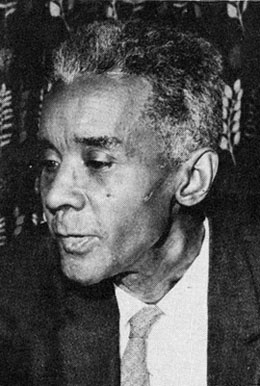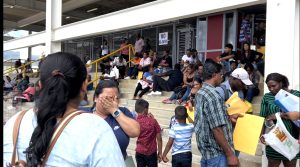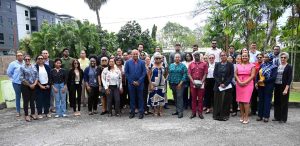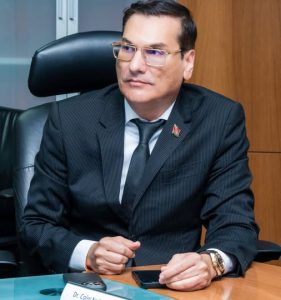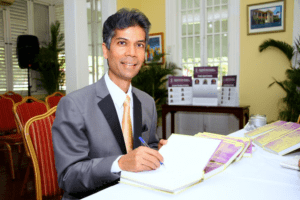
WALTER Rodney, a Pan-Africanist and scholar, described CLR James as a “revolutionary intellectual.”
Another activist viewed James as a militant. James in an unorthodox style did not separate the issues of culture, identity and race from the material struggles.
This allowed for the incorporation of Marxism/Trotskyism and Pan-Africanism in a flexible and unique worldview. Paul Buhle was accurate in identifying James as “mentor and guide” to the later phase of the Pan-African movement.
Furthermore, Buhle noted that James transformed Marxism into a coherent “theory of mass revolt” and “Leninism humane as an organized insight into the central role that Third World masses would play.”

Indeed, James pioneered the idea of an autonomous Black movement which was socialist in nature but not influenced by the predominantly White trade unions and political parties.
In the early decades of the 20th century, such European upheavals as the Russian Revolution in 1917 helped develop a unique perspective of James. Events affecting African states such as the Italian invasion of Ethiopia and subsequent struggles against colonialism automatically made him more aligned to the Pan-African struggle. Furthermore, this fierce advocate of Pan-Africanism communicated with intellectuals and activists such as Jomo Kenyatta of Africa, and two Trinidadians- George Padmore and Eric Williams. This coupled with the editing of newspapers and organising discussion groups made CLR James one of the leading Pan-Africanists of the 20th century.
The existing Black consciousness and the 1919 strikes in Port of Spain (the capital of Trinidad and Tobago in the British West Indies), were early influential forces that contributed to James being more acutely aware of his African identity. The 1919 race riots in Chicago also had an impact on James as he became more acutely aware of the race problem in the United States. Such experiences and events assisted in James’ formulation of a unique brand of Pan-Africanism.
During 1970s, James continued to assist the African and West Indian diaspora in England who were interested in improving the lives of Blacks. This continued into the 1980s, as James delivered a considerable number of speaking engagements in England. In August 1980, James contacted his nephew- Darcus Howe (a Black Trinidad-born activist) who lived in Brixton and arranged for James to deliver three lectures in November.
A remarkable feature of James was his ability to continue as a vibrant speaker in his twilight years. For instance, in February 1984, he was invited by the Zimbabwe African National Union ZANU-PF to witness their annual Congress during 8-11 August 1984. During that month, James was invited to participate in an international conference on Namibia entitled “1884-1984: 100 years of Foreign Occupation, 100 years of Struggle.” Later in June 1987 James spoke about Garvey on the programme- “Black Londoners” organised by Radio London. The charisma of James was one trait that made him a choice as speaker.
James was able to be an authoritative voice on Africa largely due to his voracious reading. The plethora of literature available in his collections in North America and Trinidad provide evidence of his interests. For instance, in the James Collection at OWTU there are newsletters, pamphlets, newspaper clippings and magazines including Southern African News, The Black Scholar and Africa Bulletin.
Towards the end of an illustrious and colourful life, James was the recipient of a number of awards. In 1983 the West Indian World, a newspaper based in London, informed James that he was a nominee for their first ever- Black Community Achievement Awards. Two years later he received the “African Freedom Award.” James expressed thanks for being judged the winner, however, ill-health prevented him from attending and Robert A. Hill agreed to accept the award on James’ behalf. Hill acknowledged James’ monumental contribution, “He is the last truly great Pan-African figure still living. His many and varied contributions over a span of fifty years to the conjoined cause of West Indian independence, African freedom, and Afro-American struggle have helped to shape the history of the present century in significant ways.” In 1986, The Emancipation/Freedom Day Committee of Trinidad and Tobago informed James that they would present him with an award for his monumental contributions.
His publications, speeches and writings served as an inspiration to Pan-Africanists, academics, students and activists in Africa, Europe, the Caribbean and United States. The genius of James assumes even greater proportion when one considers the fact that James only possessed a high school education and never received a university education. The enigma of James rests largely upon his paradoxical class-based Afrocentrism and ability to overcome overwhelming obstacles.
Dr Jerome Teelucksingh is an activist. He initiated the inaugural observances of International Day for the Elimination of Violence Against Men and Boys (January 31) and World Day of the Boy Child (May 16). He has made academic presentations at tertiary institutions including Harvard University and Oxford University.
See other articles by Dr Jerome Teelucksingh on AZP News:
The Blackest Thing in Slavery wasn’t Slaves
The Importance of Emancipation Day
Tobago’s Working Class in the 1920s, 1930s
Are Humble Caring Fathers Champions?
Influencing West Indian Masculinity
Defining Caribbean Masculinity
Is Monogamy Encouraged in the Caribbean
Naps Girls: From Humble Beginnings to Excellence
US Media Creates Cultural Dependency in the Caribbean
Bloodless Revolution to Save Lives in Developing Countries
The Need for a Social and Moral Revolution
The Law of Supply and Demand in Developing Countries
End the Dependency for Developing Countries
T&T Carnival and the Emperor’s New Clothes
The Influence of Labour on Caribbean Integration
The illusion of political Unity
Presbyterians in Trinidad: Humble Missionaries, Local Workers
Religious Plurality: Curse or Blessing
Caribbean Youth Need Optimism, Patriotism
Rethinking Identities in Caribbean, Latin America
November 19: All Inclusive International Men’s Day
Should International Agencies be Blamed for Unemployment
A Need to Observe Word Unemployment Day
An Ideology for the Trade Union Movement
The Man who Couldn’t be Prime Minister
Social Outburst vs Social Revolution
Challenges of the Men’s Movement
If George Floyd was Denied Parole
The Meaning of Indian Arrival Day in T&T
International Men’s Day – A Way of Life
Wounds that cause school violence
May Day: A Time for Solidarity, Strength
Who Coined the Term ‘Black Power’
The illusion of political Unity
Presbyterians in Trinidad: Humble Missionaries, Local Workers
Religious Plurality: Curse or Blessing
Caribbean Youth Need Optimism, Patriotism
Rethinking Identities in Caribbean, Latin America
November 19: All Inclusive International Men’s Day
Should International Agencies be Blamed for Unemployment
A Need to Observe Word Unemployment Day
An Ideology for the Trade Union Movement
The Man who Couldn’t be Prime Minister
Social Outburst vs Social Revolution
Challenges of the Men’s Movement
If George Floyd was Denied Parole
The Meaning of Indian Arrival Day in T&T
International Men’s Day – A Way of Life
Wounds that cause school violence
May Day: A Time for Solidarity, Strength
Who Coined the Term ‘Black Power’
![]()


